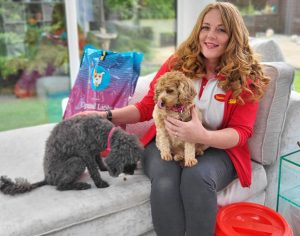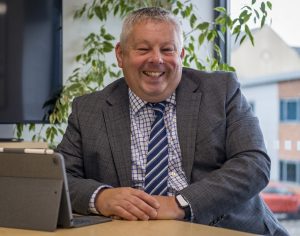Photo credit: Karen Massey/Bart Thomas
If ever there was a sign Alana Spencer had the makings of an entrepreneur destined for greatness, it was a £2,000 profit she made from her schoolteachers during her GSCE year. “I taught myself how to make chocolates and sold some to friends and family,” Spencer recalls. “And one Christmas I took in order forms and some samples for my teachers and I got a couple of thousand pounds of orders. When you’re 16, that’s quite a lot of money – I’ve always had a passion for business, probably more so than food to be honest.” Chances are after that payday she was even more passionate about the hustle of entrepreneurialism. But like all great tycoons, Spencer’s story didn’t happen overnight but had been years in the making.
Spencer’s appetite for cookery kicked off when she was about seven, which her mother recognised and fostered. “My mum bought me a book on how to make Artisan chocolates and I taught myself,” she details, confessing her love of confectionery got the ball rolling. “I’ve been baking since I was a child, my parents would let me go into the kitchen and create whatever I wanted and nine times out of ten they were quite gross. I made cheesecake out of cheddar once.”
Growing up in a foodie family was something of an introduction to the delights of scrumptious grub, as meals would play a big part of gatherings with extended family. But largely the urge to cook was something the young Spencer had within her as opposed to something she learnt from her parents – although her mum’s career had some bearing. “My mum’s an artist, so she was always creating and there were always wacky creations around the house but they weren’t food-related,” explains Spencer. “But food is creative and so I guess I got that from her.” And while other children her age would be eager to get home and watch cartoons or play with computers in their spare time, Spencer found herself baking or tuning into cooking shows. “I loved Ready Steady Cook when I was a child,” she recalls.
So understandably, Spencer had perfected her candy-creating crusade by the time she was ready to sit her exams, hence the ability to empty the pockets of her teachers. But selling sweets was by no means her first venture. “I’ve always loved having little schemes – I did car washing and stuff like that,” she says. “The first thing I ever did was a card business and I made handmade cards. They were really nice but they took me about half an hour each to make and I was selling them for £2, so it was basically slave labour. But that was my first kind of exciting look into business that I could turn something into money.” At the age of 14, Spencer had streamlined her card-creating craft and secured a £50 business order from her uncle who wanted to send festive cheer to his clients one Christmas. “I was kind of obsessed with making pocket money and then it went into chocolates,” she details, demonstrating an early understanding of investment.
After leaving school, Spencer was keen to continue on the entrepreneurial journey but shocking exam results presented another path she had the chance to walk along. “I’m dyslexic but I got quite good grades in my GCSEs, which no one was expecting,” she admits, having assembled a clean sweep of As and Cs. “I was kind of expecting Cs at best.” With Spencer’s father being an academic possessing a PhD in chemistry, she felt like it would be a shame to pass up on continuing her study. “Although I wanted to go and do my business then, it was very much encouraged to go and do A-levels, which I did – well I did half, I didn’t finish,” Spencer laughs.”
Having completed work experience at a restaurant during her time at school, the venue had subsequently given her a Saturday job making cakes. But during A-Levels, Spencer expanded her chocolate range to incorporate cakes and started renting a spare kitchen, which is where her business was bestowed a name: Narna’s Cakes. She would head to the kitchen after school to bake instead of going home to revise, while weekends were spent selling her wares to delis and at farmers markets. “I’d massively taken my eye off the ball with my studies,” admits Spencer.
The entrepreneurial bug had apparently taken hold and was incurable at this point, which meant the chocolatier made her venture a full-time commitment by the time she was 18. “It just made sense to start the business because I was really passionate about it,” Spencer says. Still, her ardour didn’t totally numb the sense of fear and anxiousness. “I think everyone including myself was quite worried about it because it’s a big step,” she recalls. “I still lived with my parents so I was quite lucky I had that [support] to be able to start [up] while I was growing it but it was quite a scary moment.” Continuing to use the kitchen she was already renting for another year, Spencer was eventually forced to find a new premises as a change of owners meant they needed the facility she was using so they could expand themselves.
Ever the grafter, Spencer found another location where she could roll up her sleeves, having worked there as a waitress. The only caveat was that the kitchen had to be used at night – but there was an upside: the sleepless evenings meant she was able to save money through a mutually beneficial agreement. “It actually came in quite well because I gave that cafe some of my cakes to try and they sold really well, so they said ‘You can use our kitchen at night for free because you’re making cakes for us,'” she reveals. So while making goods overnight became the norm, so did sleeping during the day – when she wasn’t delivering to shops or selling at events and markets on weekends. “It was a really weird time actually – a weird pattern and routine,” Spencer explains. “But I felt so obsessed with making it work.””
And work it did. Securing a government grant meant Spencer was able to put money towards equipment of her own, while she pooled her own savings together with her parents, who agreed to build an extension on the side of their house, which became her very own bakery. “That’s where I worked for the next several years,” she reminisces. “So working at home I’d go into the kitchen and bake all day and it was never-ending. At that point it was starting to get really busy because I wasn’t just doing markets locally, I was travelling to festivals and that’s where the business really started getting busy.”
“
Her fear about change proved to be relatively unfounded. While franchising would become a key ingredient for business growth following the show, Sugar was eager not to leave a sour taste in Spencer’s mouth but simply sought to sweeten the deal. “Lord Sugar basically said ‘You’ve a business here that’s profitable and doing really well, why would you stop all that and go into a complete unknown?'” Spencer remembers. Effectively, the point Sugar was making is that while she could go to a food event and have a quiet day for sales, there’s always the next weekend to pick them up. But shifting the company to focus on store-based retail, for example, could have been “risky new territory” with potential to make it “game over” for the business, according to The Apprentice boss. And in terms of franchising, Sugar was already in ownership of a franchise-based business when the idea arose to use the model with Ridiculously Rich by Alana.
Describing Sugar’s existing franchise operation as “really successful,” Spencer could see the appeal in franchising her own business. The model certainly outweighed the other avenue to growth, which would have been employing staff to go out to the festivals, as she and Sugar realised it wasn’t feasible logistically. “There’s a lot of risk with [hiring people] because obviously there’s money that needs to be taken, there’s the products, you’ve got to have your own [company] vehicles and nobody was really up for that because it would be too challenging I think,” Spencer says. “So we needed to find a way of getting our products out there and franchising made the most sense.”
Demonstrating the power of having Sugar on board as a partner, Spencer was able to leverage another of his businesses from The Apprentice, digital marketing agency Climb Online, which helped develop an advert to showcase the responsibilities of a Ridiculously Rich franchisee – or ambassadors as they’re referred to by the business. “We put it on Twitter and said we’re recruiting and got just over 100 applications,” says Spencer. Eager to get connected and wanting to be as personable as possible, she started to arrange meetings with the most suitable candidates – but overlooked one minor detail in the process. “It’s quite funny, I was initially planning on meeting them all in a day and I think little things just completely slip your mind when you’re so busy,” laughs Spencer. “I had a board meeting and Lord Sugar said ‘How many people have we had apply?’ I told him and he said ‘How are you going to talk to them all?’ and I said ‘I’ve got this day pencilled out’. He said ‘You’re going to talk to 80 people in one day?’ And Mike, one of advisers, calculated it and said ‘That’s one every four minutes.'” Unsurprisingly, the one day meeting with applicants was spread over four days instead.”
Using Sugar’s wisdom, the pair decided to bring in just a fraction of the applicants initially to gauge performance. “Lord Sugar said ‘Don’t take any more than 20 on in your first round because we need to know this is going to work – if anything goes wrong with the logistics we don’t want to let 80 people down so we need to grow slowly,'” Spencer reveals. “I think a lot of people probably think he’d be the one going, ‘Come on, push, push, push’ but he was actually very sensible and happy to let it grow slowly in that respect.”
Following a training day that saw ambassadors equipped with all the necessary tools to get up and running, Spencer realised she was onto a winner. “I got people out there selling my cakes the way I was – at food festivals, farmers markets, country shows, dog shows and everywhere you could sell cakes,” she explains. And demonstrating how important franchising is for Ridiculously Rich by Alana, it accounts for 90% of sales while online powers the rest. There were a couple of factors of upmost importance to Spencer though and profit wasn’t one of them – at least not for Ridiculously Rich by Alana. “There’s enough in it for the people that franchise to be able to make a really good margin so we just thought ‘Let’s take a cut ourselves and, in doing that, we’re going to get the best people we can because we’re going to get the people that care and want to grow their own business,'” she reasons. “I don’t want to make any money unless they’re making money. So if they’re having a bad time of it I don’t want to then say ‘I also want the monthly instalment because you’re part of this business.'” Spencer points to the red-hot summer of 2018 and said the heat would have impacted sales negatively. “So it’s not fair to then say ‘Okay, you’ve had a tough time but I still want money off you,'” she declares. “We’re all in this together, we’ve got a really good retention rate with our ambassadors.”
With around 70 ambassadors in the network now, the approach has worked well. Even the costs for entry are low to encourage new joiners to snap up a Ridiculously Rich by Alana franchise. “Unlike most franchises which can be upwards of £15,000 we just charge £1,000, which covers the first bit of stock [and] your setup when you go to events,” Spencer says. “What I’ve tried to do is create something a little bit different to a normal franchise that interests people that aren’t only interested in growing the business but also interested in the support element. Although it’s a franchise, I actually like to call it a friendly franchise or more of a family.” And that’s precisely why the term ambassadors is used rather than franchisees. “It’s really important they feel like they’re part of something and not just a number,” she says.
In addition to ambassadors, there’s another model available in the franchise – cakepreneurs. While ambassadors can sell at the numerous events on top of supplying wholesale customers, cakepreneurs have a focus on just the latter. “As a cakepreneur you can sell just to wholesale customers and obviously friends and family and do little bits like wedding favours and those sorts of things,” Spencer explains. “Ambassadors were so busy selling to events that the wholesale side needed some more people to go out there to get our stock into cafes and delis so that’s why we created the separate role of cakepreneur.” Interestingly though, while the cakepreneur approach suits many on a permanent basis, it serves as a stepping stone for others – especially since the fee for entry is £150. “It’s quite a good way to try before you buy and come into the franchise as a whole,” Spencer opines.
Going even further, some ambassadors are becoming something else entirely as they talk to bigger clients. While this is a duty that Spencer also takes on, she works with them on securing the larger accounts, which they’ll then look after accordingly. “It’s all changed over the last two years,” says Spencer. “I didn’t know what it was going to be when I first went into it, I never franchised and didn’t really have the foggiest of what I was doing to be honest but I worked with these people that believed in me and now they’re growing their businesses. They’re so ambitious, they want to be working with bigger and bigger customers.”
Looking ahead, Spencer has huge targets in mind for Ridiculously Rich by Alana as she always has her eyes out for new ambassadors. “The way I envisage it over the next couple of years is we’ll probably end up with 200 [franchisees] altogether, cakepreneurs and ambassadors, and then we’ll have around 50 of those that are interested in doing big accounts,” she details. Of course, growing the network will mean increasing the size of the internal team, which currently includes Spencer, Bart and ambassador manager Stacey. “But I don’t want to,” Spencer laughs on the topic of hiring more people. “At the moment we’ve got such a good little team and we’ve all got very different skills but I’m sure I’ll take someone on and they’ll fit in perfectly.””
Although Spencer thought the approach to sales would be to target supermarkets from the get-go, she’s happy to have strolled along the franchising route. “What I have done in my opinion is a million times better than that,” she concludes.”

Zen Terrelonge
As editor, Terrelonge can be found on the hunt for all things startup and scaleup - that's when he's not busy talking babies via DADult Life. Whether it's health or hospitality, food or philanthropy, tech or travel, he'll be seeking out the most interesting entrepreneurial developments to run in the magazine and online.

Zen Terrelonge
As editor, Terrelonge can be found on the hunt for all things startup and scaleup - that's when he's not busy talking babies via DADult Life. Whether it's health or hospitality, food or philanthropy, tech or travel, he'll be seeking out the most interesting entrepreneurial developments to run in the magazine and online.


































